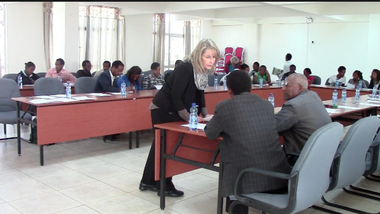|
The Challenge and the Promise of Teaching Early Grade Reading in Low-Resource Countries
“Education quality is at the heart of development. A nation’s economic prospects follow the learning curve of its children.”
Early Reading: Igniting Education For All (RTI, 2011)
The Early Grade Reading Assessments (EGRA), developed by RTI in 2006 has been administered in many low-income countries across the world. They revealed that despite a dramatic increase in the number of children attending school in these countries, the quality of education is poor. A central concern is the reading deficits of the children.

English Language Teachers’ Association, Addis Ababa, Ethiopia “Teaching Vocabulary With Mind Maps”
In countries such as Ethiopia, the oral traditions of language and poverty have contributed to teaching methods that stress call and repeat teaching of the alphabet and a paucity of books. Efforts are underway to teach teachers how to teach reading. College curriculums are being written for courses in the teaching of reading and writing. Books written in mother tongues and the national language, Amharic, are being prepared that are appropriate for beginning readers. Plans are being made to provide teachers with in-service workshops that stress child-centered practices.
CMT’s work in Ethiopian schools with administrators, teachers and children has demonstrated the enthusiasm teachers have for engaging children in the teaching of reading and the children’s readiness to engage with print thoughtfully and joyfully. CMT’s model for raising professional expertise and student achievement by responding to demonstrated needs with personal engagement provides a rare opportunity to schools at this crucial time of change and growth.










